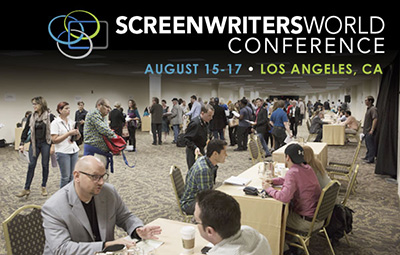Last weekend was the Screenwriters World Conference in L.A. It was a great opportunity for me and the 100s of writers attending to hear directly from the screenwriters, managers, agents and producers working in Hollywood today.
There were many fabulous sessions on the craft of screenwriting; writing the spec, writing for tv, writing the micro-budget film, writing web series, writing subtext, writing the emotional core, writing compelling characters, writing horror. Whatever your screenwriting interest, there was someone with experience in that specialism there to help you get to grips with it.
What struck me was that not just the delegates but the speakers too were incredibly well-read on the craft of screenwriting. There was a strong sense that becoming a great screenwriter is about learning your craft. Most of the people I met, whether aspiring delegates or experienced speakers, have read a huge number books on screenwriting and continue to want to study the craft in order to become more skilled at it. It was not so much being a slave to a set of screenwriting rules but rather having as many tools in your arsenal as possible to help you tell the story you want to tell. I might have read 20+ screenwriting books and been a professional script editor for over ten years but I certainly came away with a big new list of screenwriting must-reads. TOP TIP: Learn your craft by reading screenwriting books, watching films/tv and reading scripts.
As well as honing their craft the delegates also had the chance to hear how to develop their screenwriting career. Certainly, the question that I get asked the most is; how do I get my writing noticed? I know from experience the frustration that new writers feel on trying to ‘break in’ to an industry that looks like a closed shop. Of course it’s not, and new writers are getting noticed, getting repped, getting meetings and getting gigs all the time. For me, the sessions on establishing a screenwriting career were of particular interest so that I can better help my writing clients to develop their screenwriting career in UK and the US in both film and television. TOP TIP: Learn who’s who by reading the trades.
My writing clients have had great success and got representation following wins or finalist placings in the prestigious screenwriting contests like the Nicholl Fellowship, but I was keen to hear whether the big managers and agents really take notice of contests. I made sure to attend the session on Getting An Agent with Jake Wagner of Benderspink, Josh Dove of Haven Entertainment, Zac Frognowski of Grandview and moderated by Script Mag Editor Jeanne Bowerman. Since none of these guys take unsolicited approaches, how do they find new writing talent? The answer was recommendations from colleagues, contest placings and other filter platforms like The Black List. TOP TIP: Learn who is getting deals for their writers by reading the trades.
Of course not all screenwriting contests are equal but they definitely see the most prestigious contests as a kind of vetting process. Jake makes sure he and his team take a look at all the finalists of contests like Script Pipeline. In addition, the Nicholls circulate the loglines and contact details of their quarter-finalists to the industry so if you do well in the big screenwriting contests your work is getting seen by people you couldn’t otherwise get access to. TOP TIP: Research the contests that give their finalists great exposure.
Many producers, agents and managers also attend pitching sessions like the one held at SWC, as well as at other prestigious events like Story Expo, The Great American Pitchfest, and the London Screenwriters’ Festival. Pitching at events like these can get you read-requests and, if they like what they read, that all-important general meeting and the start of a working relationship. TOP TIP: Attend pitching events to start meeting and building relationships with managers, agents and producers.
The big take-away for me was that yes, it’s tough but it is also possible to make it. If you hone your craft, write killer material and develop a strategy for your career then becoming a professional screenwriter is within your reach.




